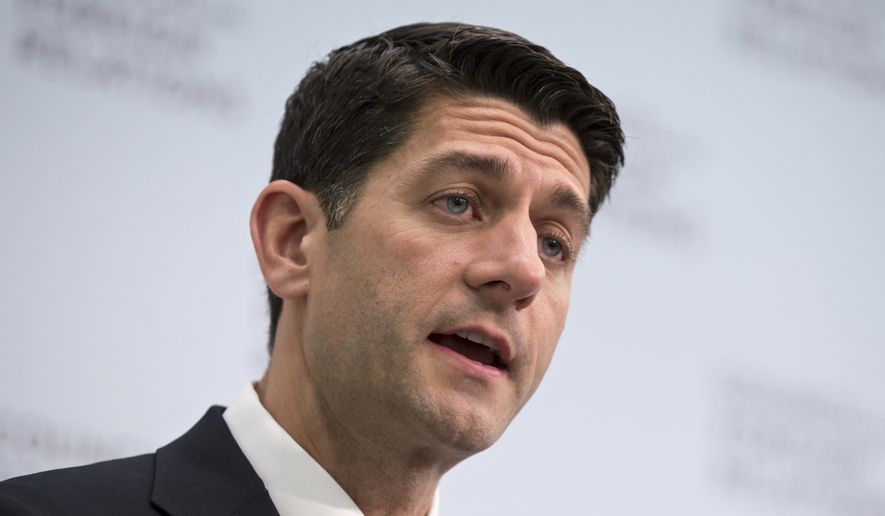House Republicans said Tuesday that Washington’s red tape has gotten out of hand, and they proposed cutting rules limiting oil drilling and coal mining, governing internet traffic and shaping small business hiring and pay.
The plan is the third in the House GOP’s six-part election-year agenda, and is meant to be a blueprint for unshackling the American economy.
Speaker Paul D. Ryan and his GOP troops revealed their outline in a park between the Capitol and the Labor Department — an attempt to contrast their own efforts with those of the “nameless” bureaucrats who write burdensome regulations.
“If the proposals that are cooked up in these bureaucracies are really so important, then let the people’s elected representatives decide — no major regulation should become law unless Congress takes a vote,” Mr. Ryan, Wisconsin Republican, said.
Mr. Ryan released the GOP’s anti-poverty and national security proposals last week, and still to come are plans on the Constitution, tax reform and health care.
Dubbed “A Better Way,” the agenda is designed to unify the party, so it left out areas of disagreements within the GOP, such as immigration and trade reforms — two areas where Mr. Ryan clashes with presumptive Republican presidential nominee Donald Trump.
The agenda, however, has been overshadowed by Mr. Trump’s outsider personality, with Mr. Ryan and fellow Republicans having to answer questions about their new party leader even as they try to push their own policies.
On Tuesday, 10 protesters tried to drown out Mr. Ryan and his GOP colleagues by chanting anti-Trump slogans from across the street.
While Rep. Steve Chabot, Ohio Republican, spoke about overtime rules and regulations on small business, the group shouted, “Say no to racism.”
Natural Resources Committee Chairman Rob Bishop, Utah Republican, then spoke about land permits as the distant chorus shouted, “GOP — party of Trump!”
The House GOP says regulations cost the U.S. nearly $2 trillion in productivity and growth last year, kneecapping an economy that is still struggling to recover from the 2008 recession.
To speed things up, the party wants to tap more energy resources at home, saying it is possible to preserve the environment without regulating the coal industry out of business, killing thousands of jobs in the process.
On finance, the House GOP will insist on “bankruptcy, not bailouts” for flailing firms on Wall Street so that taxpayers aren’t on the hook when big banks fail. They said 2010 financial reforms by then-Democratic Reps. Barney Frank and Chris Dodd have only made it harder for community banks to stay in business.
“We were told the regulations of Dodd-Frank would make our economy more stable, but the regulations have led to the big banks getting bigger and the small banks getting fewer,” House Financial Services Committee Chairman Jeb Hensarling, Texas Republican, said.
Heritage Action, a conservative pressure group, said it was impressed by the plan, while House Democrats said it would effectively allow the government to turn a blind eye to significant consumer protections.
“This special interest Republican agenda would poison the air we breathe and the water we drink, while rolling back critical protections for American consumers and taking the cops off the Wall Street beat,” Minority Leader Nancy Pelosi, California Democrat, said.
The GOP did say it should reform the Consumer Financial Protection Bureau — an outgrowth of the 2008 financial crisis — instead of scrapping it outright, as some conservatives would like.
The bureau released controversial rules this month to crack down on “payday” lenders that offer short-term loans to help people make ends meet, though some say these companies ensnare low-income Americans in a “debt trap” of new borrowing and fees.
The House GOP wants to rein in federal rules that are increasing compliance costs on colleges and universities, raising tuition in the process, and make sure the National Labor Relations Board does not allow “ambush” union elections that prevent employers from speaking to their workers before they vote.
Their plan would also force the Federal Communications Commission to shoulder the burden of proof to justify new regulations on the internet, rather than forcing the public to demonstrate why certain rules are no longer needed. The plan also proposes a one-page bill to let victims of frivolous lawsuits be compensated for any harm they’ve suffered.
• Tom Howell Jr. can be reached at thowell@washingtontimes.com.




Please read our comment policy before commenting.